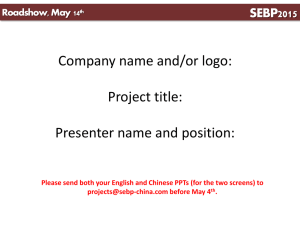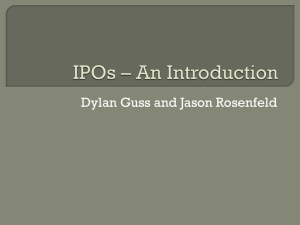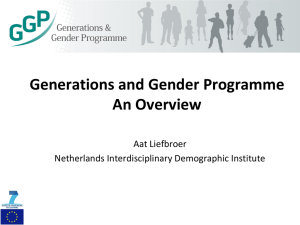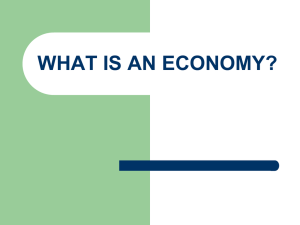Demographic Challenges
advertisement
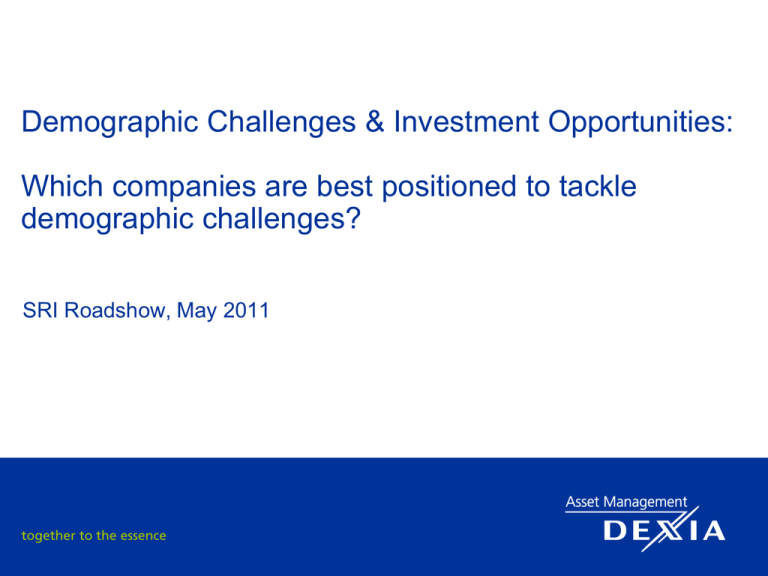
Demographic Challenges & Investment Opportunities: Which companies are best positioned to tackle demographic challenges? • SRI Roadshow, May 2011 Agenda I. Demographic Trends II. Challenges Posed by Demographic Trends Workforce, Consumer Base and Resource Impacts III. Business Opportunities and Solutions to Demographic Challenges – The Investment Case Overview of Business Solutions to Demographic Challenges Skills Shortages – the Education Services Solution Base/Bottom of the Pyramid – the Affordable Telecoms Solution Ageing Population-focused Products – the Healthier Living & Quality-of-Life Solution Resource Scarcity & Environmental Degradation – the Hygiene & Sanitation Solution IV. Stock Selection & Market Opportunities V. 2 Conclusions 2011 SRI Roadshow I. Demographic Trends Definition Demography is the study of population size, growth and age structure, and of the forces that lead to population change (fertility, mortality, migration) Global Population Growth & Projections Source: UNDP Global populations are expected to grow from current levels of almost 7 billion to over 9 billion by 2050 (UN) 3 2011 SRI Roadshow Demographic Trends Demographic trends have impacts on different, yet interrelated outcomes • Geographical Breakdown Annual population growth by major region, millions By 2050, 86% of the world’s population (almost eight billion people) will be concentrated in less developed regions of the world Age Structure Source: SocGen, 2007 Population aged 60 or over between 1950-2050, millions By 2050, approx. two billion people will be aged 60 or over Source: UN, 2009 • Urbanisation By 2050, 6.3 billion people are Population living in urban areas, % expected to live in urban areas 4 2011 SRI Roadshow Source: UN, 2006 Demographic Trends Two main demographic trends are emerging Growing Populations Higher population and economic growth rates, which results in: Increased international migration, and Growing rates of urbanisation Ageing Populations Increased life expectancy, particularly among women, and Lower fertility rates, which results in: Higher share of elderly people 5 2011 SRI Roadshow II. Challenges Posed by Demographic Changes Three main challenges posed by demographic changes affect…(1) the workforce Changes in the Workforce Skills shortages will primarily be present in: Working age population to total population, % Developing countries where educational shortfalls may exist Developed markets where a significant proportion of the working population nears retirement age, with little prospect of worker replacement Source: UN Population Database & Bank of America/ML, 2011 6 2011 SRI Roadshow Challenges posed by Demographic Changes …(2) consumers Changes in the Consumer Base • Increasing product and service needs for: Worldwide, over three quarters of the population are low-income Low-income consumers in developing markets Consumers with higher disposable NEEDS A GRAPHIC HERE incomes in all markets Ageing populations in developed markets * PPP – Purchasing Power Parity Source: AT Kearney 7 2011 SRI Roadshow Challenges posed by Demographic Changes …(3) resource scarcity and the wider environment Increasing Pressure on Resources and the Environment • • Ability to provide products and services which lessen impacts on resource depletion and environmental degradation are key Population growth leads to rising consumption and increasing pressure on scarce resources If current consumption rates continue, by 2050 a global population of over nine billion will require the biological capacity of two Earths Source: Goldman Sachs, 2010 8 2011 SRI Roadshow III. Business Opportunities and Solutions to Demographic Challenges The Investment Case • Three main challenges resulting from demographic change have resulted in numerous business opportunities for companies Challenges Business Opportunities 9 2011 SRI Roadshow Changes in the Workforce Skills Shortages Changes in the Consumer Base Base/Bottom of the Pyramid (BOP) Wealthier Consumers Ageing Populationfocused Products Pressure on Resources & the Environment Resource Scarcity & Environmental Degradation Business Opportunities and Solutions to Demographic Challenges Changes in the Workforce – Skills Shortages Challenges Business Opportunities Solutions Changes in the Workforce Changes in the Consumer Base Skills Shortages Base/Bottom of the Pyramid (BOP) Education Services Affordable Healthcare Employment & Outsourcing Services Affordable Food & Nutrition Automation Services Affordable Finance Access to Telecoms Access to Transport Access to Energy Fairtrade Systems 10 2011 SRI Roadshow Pressure on Resources & the Environment Wealthier Consumers Ageing Populationfocused Products Resource Scarcity & Environmental Degradation Aspirational Products Healthier Living & Quality of Life Food Productivity Financial Security Hygiene & Sanitation Management of Resources Business Opportunity – Skills Shortages Challenges Changes in the Workforce Business Opportunities Skills Shortages Finding ways to maintain employee productivity offers solutions Pressure on Resources & the Environment Changes in the Consumer Base Base/Bottom of the Pyramid (BOP) Wealthier Consumers Education Services Affordable Healthcare Aspirational Products Employment & Outsourcing Services Affordable Food & Nutrition Automation Services Affordable Finance Ageing Populationfocused Products Resource Scarcity & Environmental Degradation Healthier Living & Quality of Life Food Productivity Financial Security Hygiene & Sanitation Management of Resources Access to Telecoms Solutions Access to Transport Access to Energy Fairtrade Systems What is the issue? Ageing workforce which is close to retirement age ► loss of skills and knowledge Lack of education and vocational training ► lack of qualified new entrants into the labour market % Employers having difficulty filling jobs due to lack of available talent Projections of skills' requirement in the EU until 2020 EU Skills breakdown in total employment (%) • United Kingdom Spain Ireland France Czech Republic Sweden Netherlands Belgium Greece Germany Poor recruitment and employee retention policies and programmes ► lower productivity and higher turnover costs • 50 45 Medium qualification 40 High qualification 35 30 25 20 Low qualification 15 1996 2001 2006 2015 2011 SRI Roadshow 2020 Hungary Austria Italy Romania 0% 10% 20% 30% 40% 50% 60% Source: Manpower, 2010; CEDEFOP, 2008 Business Solutions Education Services 11 55 Employment & Outsourcing Services Automation Services Business Opportunity – Skills Shortages Business Solution Example Education Services • Emerging and developing economies: Gross Enrolment Ratio by Expected Years of Schooling, 1970-2007 Lack of education is a major obstacle to development New technologies and increased access to the Internet may assist in offering a cheaper alternative • Developed economies: Opportunities will increase for multi-skilled workers and those able to adapt to new technical or cultural environment Source: UN Human Development Report, 2010 Focus will be on companies providing educational material for educational systems with a significant client base in emerging and developing countries 12 2011 SRI Roadshow Skills Shortages – Education Services Well-positioned Company: Pearson • Publisher with 70+% revenues derived from education-related services Focus on the provision of education Growth in Emerging Markets, revenues USD million services ► education division is expected account for bulk of growth in revenues and profits in future Opportunity in the shift to digital education programmes ► digital education revenue mix has increased from 30% to 44% over the period 2005 - 2010 Recent Company Acquisitions Over 20% revenues derived from Asia and other parts of the world ► strong opportunities to expand in unsaturated media markets * £228m paid for 70% with the balance to be paid in 2011 13 2011 SRI Roadshow Source: Pearson, 2011 Business Opportunities and Solutions to Demographic Challenges Changes in the Consumer Base – Base/Bottom of the Pyramid Challenges Business Opportunities Solutions Changes in the Workforce Changes in the Consumer Base Skills Shortages Base/Bottom of the Pyramid (BOP) Education Services Affordable Healthcare Employment & Outsourcing Services Affordable Food & Nutrition Automation Services Affordable Finance Access to Telecoms Access to Transport Access to Energy Fairtrade Systems 14 2011 SRI Roadshow Pressure on Resources & the Environment Wealthier Consumers Ageing Populationfocused Products Resource Scarcity & Environmental Degradation Aspirational Products Healthier Living & Quality of Life Food Productivity Financial Security Hygiene & Sanitation Management of Resources Changes in the Workforce Challenges Business Opportunity – Base/Bottom of the Pyramid Business Opportunities Base/Bottom of the Pyramid (BOP) Wealthier Consumers Education Services Affordable Healthcare Aspirational Products Employment & Outsourcing Services Affordable Food & Nutrition Automation Services Affordable Finance Skills Shortages Emerging lower income consumers offer growth opportunities Solutions Changes in the Consumer Base Resource Scarcity & Environmental Degradation Healthier Living & Quality of Life Food Productivity Financial Security Access to Telecoms Access to Transport Access to Energy Fairtrade Systems • What is the issue? Access to essential goods and services Estimated BOP market by sector, USD 5 trillion ICT HEALTH ► human right WATER Growing low-income populations ► over 4 billion people with a market opportunity estimated to be almost USD 5 trillion TRANSPORT OTHER ENERGY FOOD Providing the right products ► affordability, availability, acceptability, accessibility • Business Solutions Source: WRI/IFC, April 2007 Affordable Food & Nutrition Affordable Finance Access to Telecoms Access to Transport Access to Energy Fairtrade Systems 15 HOUSING Affordable Healthcare 2011 SRI Roadshow Pressure on Resources & the Environment Ageing Populationfocused Products Hygiene & Sanitation Management of Resources Business Opportunity – Base/Bottom of the Pyramid (BOP) Business Solution Example Access to Telecoms • Digital Inclusion Index 2011 Main opportunities in mobile technologies and Internet access Mobile telephony offers new ICT solutions to regions that used to be without access Imbalance in Internet access • BOP market size for ICT estimated to be worth USD 51 billion Source: Maplecroft, 2011 Focus will be on companies providing ICT services in emerging and developing countries, particularly those countries with low ICT penetration rates, as well as ICT providers with low-cost business models 16 2011 SRI Roadshow Base/Bottom of the Pyramid – Access to Telecoms Well-positioned Company: Millicom International Cellular • Offers mobile telephony and cable services in 13 emerging markets Operations in Latin America and Africa ► attractive markets due to relatively low penetration of telephony services Market share in countries of operation Low-cost ICT provider strategy ► operates in countries with low GDP/capita Emphasis on ‘Affordability’ ► focus on prepaid services with low denomination charges using mass market distribution services During Q4 2010, customers were up 14% and organic revenue growth was double digit ► revenue growth expected to remain double digit 17 2011 SRI Roadshow Source: Millicom International Cellular, 2011 Business Opportunities and Solutions to Demographic Challenges Changes in the Consumer Base – Ageing Population-focused Products Challenges Business Opportunities Solutions Changes in the Workforce Changes in the Consumer Base Skills Shortages Base/Bottom of the Pyramid (BOP) Education Services Affordable Healthcare Employment & Outsourcing Services Affordable Food & Nutrition Automation Services Affordable Finance Access to Telecoms Access to Transport Access to Energy Fairtrade Systems 18 2011 SRI Roadshow Pressure on Resources & the Environment Wealthier Consumers Ageing Populationfocused Products Resource Scarcity & Environmental Degradation Aspirational Products Healthier Living & Quality of Life Food Productivity Financial Security Hygiene & Sanitation Management of Resources Challenges Business Opportunity – Ageing Population-focused Products Business Opportunities A growing senior population has different product needs Changes in the Workforce Changes in the Consumer Base Base/Bottom of the Pyramid (BOP) Wealthier Consumers Education Services Affordable Healthcare Aspirational Products Employment & Outsourcing Services Affordable Food & Nutrition Automation Services Affordable Finance Skills Shortages Pressure on Resources & the Environment Ageing Populationfocused Products Resource Scarcity & Environmental Degradation Healthier Living & Quality of Life Food Productivity Financial Security Hygiene & Sanitation Management of Resources Access to Telecoms Solutions Access to Transport Access to Energy Fairtrade Systems • What is the issue? Rising generation of over-65s ► strong growth for certain products and services Percent of the population aged 60 or over, 20002025 16.2 20.3 24.5 18.4 27.6 24.3 Russian Federation Europe Social perspective North America 8.5 14.6 Asia ► maintenance of quality of life and the increasing need for healthcare services 8.3 15.1 Latin America & Carribean Economic perspective 10.6 15 Source: Africa UN, 2009 13.4 19.8 Oceania ► impacts on savings, investments and pensions and need for financial stability 2000 2025 Source: United Nations 2008 Revision • Business Solutions Healthier Living & Quality of Life 19 2011 SRI Roadshow Financial Security Business Opportunity – Ageing Population-focused Products Business Solution Example Healthier Living & Quality of Life Musculoskeletal Diagnoses by Age • Healthcare expenditure for over-65s are nearly four times that of younger people Functional foods present growing market opportunities 80 70 Arthritis Osteoporosis 60 50 % • 40 30 20 Increasing shift towards managed healthcare services for elderly populations 10 0 <25 25-44 45-64 65+ Age Source: McIlhargey, 2008 Focus will be on companies which: • provide healthcare services and solutions for diseases prevalent among ageing populations • offer specific products which aim to help consumers maintain a high living standard for as long as possible 20 2011 SRI Roadshow Ageing Population Products – Healthier Living & Quality of Life Well-positioned Company: Smith & Nephew • Specialised in orthopaedics, endoscopy and wound management Products tailored to meet ageing Emerging Markets Revenue and Growth population needs ► orthopaedics (driven by hip and knee reconstruction) represents almost 60% of group revenues Emphasis on quality products ► continued margin improvement in all divisions 2009 Revenue by Regions Growth opportunities in emerging markets ► emerging market sales have risen 20% per year since 2006 Continued investment in emerging markets ► surgeon training centres and new manufacturing facilities in China Source: Smith & Nephew, 2011 21 2011 SRI Roadshow Business Opportunities and Solutions to Demographic Challenges Resources & the Environment – Resource Scarcity & Environmental Degradation Challenges Business Opportunities Solutions Changes in the Workforce Changes in the Consumer Base Skills Shortages Base/Bottom of the Pyramid (BOP) Education Services Affordable Healthcare Employment & Outsourcing Services Affordable Food & Nutrition Automation Services Affordable Finance Access to Telecoms Access to Transport Access to Energy Fairtrade Systems 22 2011 SRI Roadshow Pressure on Resources & the Environment Wealthier Consumers Ageing Populationfocused Products Resource Scarcity & Environmental Degradation Aspirational Products Healthier Living & Quality of Life Food Productivity Financial Security Hygiene & Sanitation Management of Resources Business Opportunity – Resource Scarcity & Env. Degradation Challenges Changes in the Workforce Business Opportunities Skills Shortages Resource scarcity pressures require innovative solutions Solutions Changes in the Consumer Base Base/Bottom of the Pyramid (BOP) Wealthier Consumers Education Services Affordable Healthcare Aspirational Products Employment & Outsourcing Services Affordable Food & Nutrition Automation Services Affordable Finance Pressure on Resources & the Environment Ageing Populationfocused Products Resource Scarcity & Environmental Degradation Healthier Living & Quality of Life Food Productivity Financial Security Hygiene & Sanitation Management of Resources Access to Telecoms Access to Transport Access to Energy Fairtrade Systems • What is the issue? If global population reaches 9.3 billion Food demand exceeds addition of available land for agriculture people by 2050, global grain production will have to feed an additional 2.5 billion people, an 40% increase By 2025 1.8 billion people will live in regions with absolute water scarcity, including most countries in the Middle East and North Africa Population growth is intensifying the demand for, and consumption of, non renewable energy sources Source: Goldman Sachs, 2010; World Bank • Business Solutions Food Productivity 23 2011 SRI Roadshow Hygiene & Sanitation Management of Resources Business Opportunity – Resource Scarcity & Environmental Degradation Business Solution Example Hygiene & Sanitation Ratio of Wastewater Treatment • • Up to 90% of all wastewater in development countries is discharged untreated into the natural environment According to the UN/WHO, 2.2 million people die each year from diarrheal/water-linked disease Source: UN Habitat, 2010 Focus will be on companies offering waste and water treatment products and services, but also, personal hygiene products aimed at consumers, primarily in emerging and developing markets 24 2011 SRI Roadshow Resource Scarcity & Environmental Degradation – Hygiene & Sanitation Well-positioned Company: Suez Environnement • Global environmental services (water and waste) provider Servicing water and waste management needs globally Revenue Growth by Geography in 2010 ► over the last 15 years, it has brought drinking water to 11+ million people and wastewater services to 5+ million people Environmental service growth driven by new infrastructure needs in emerging markets and upgrade of installations in developed markets ► presence in 25 countries worldwide Continual innovation in product offer ► innovative technologies in water and waste (e.g. green energy production) and water resource preservation 25 2011 SRI Roadshow Source: Suez Environnement IV. Stock Selection and Market Opportunities Stock selection of companies positioned to offer business solutions • Relevant business solutions to demographic challenges will differ depending on the level of economic development DEVELOPING ECONOMIES ECONOMIES IN TRANSITION DEVELOPED ECONOMIES Base/Bottom of the Pyramid Skills Shortages Wealthier Consumers Ageing Population-focused Products Resource Scarcity & Environmental Degradation Economic Development Level 26 2011 SRI Roadshow Stock Selection and Market Opportunities Stock selection of companies positioned to offer business solutions • Stock selection of over 500 MSCI World, SMEs and emerging market companies aligned with demographic challenges and which offer tangible solutions DEVELOPING ECONOMIES ECONOMIES IN TRANSITION Others Telecommunication Services Others Utilities DEVELOPED ECONOMIES Skills Shortages 150 companies 30 companies 192 companies Consumer Services Technology Hardware & Semiconductors Pharmaceuticals, Biotechnology Health Care Equipment & Services Food & Staples Retailing Others Media Capital Goods Banks Capital Goods Commercial & Professional Services Others Capital Goods Base/Bottom of the Pyramid Others Media Materials Resource Scarcity & Environmental Degradation 23 companies Skills Shortages Consumer Services Food Beverage & Tobacco Capital Goods 145 companies Pharmaceuticals, Biotechnology Ageing Populationfocused Products Insurance Health Care Equipment & Services Source: Dexia AM, 2011 27 2011 SRI Roadshow Stock Selection and Market Opportunities Different business solutions present varying levels of opportunity • Demographic Business Solutions offer a range of growth profiles during the next two years Current EV/EBITDA and EBITDA CAGR 2011-2013e of sector selected companies 14 A ffo rdable Fo o d & Nutritio n Valuation (EV / EBITDA 2011E) 12 A ffo rdable Healthcare Fo o d P ro ductivity Fairtrade Systems 10 A ccess to Energy Healthier Living & Quality o f Life Hygiene & Sanitatio n Dem ographic Selection A ccess to Transpo rt 8 Educatio n Services Emplo yment & Outso urcing Services A uto matio n Services MSCI World ex Financials M anagement o f Reso urces A ccess to Teleco ms 6 4 5% 28 2011 SRI Roadshow 10% 15% 20% 25% 30% Grow th Potential (EBITDA CAGR 2011-2013E) Source: Bloomberg and Dexia AM, 2011 V. Conclusions Demography is a complicated subject but it offers many investable opportunities • Two interrelated demographic trends Growing populations ► higher population and economic growth rates Trends Ageing populations ► higher share of elderly people • Challenges • Challenges implicate changes to the workforce, consumer base and even the wider environment and use of resources Business opportunities exist which offer both sustainable solutions and sound financial returns Company stock selection needs to be sensitive to both product demands and geographic exposure Solutions & Market Opportunities Small/medium-sized companies and emerging market companies generally offer more untapped ‘pure-play’ opportunities The market currently appears to integrate demographic trends into company valuations and growth prospects of well-positioned companies However, opportunities still exist for investors 29 2011 SRI Roadshow Need more information Visit us at www.dexia-am.com Our views on the latest market news Latest research published by our experts Share our managers analysis Podcasts, videos Information on Dexia AM Fund information : Latest launches NAV Reportings Portfolios Prospectus, annual reports,… 30 2011 SRI Roadshow Addresses Luxembourg Dexia Asset Management Luxembourg SA 136, route d’Arlon 1150 Luxembourg Tel.: + 352 2797-1 Belgium Dexia Asset Management Belgium Place Rogier 11 B-1210 Bruxelles Tel.: + 32 02 222 11 11 France Dexia Asset Management SA 40, rue Washington 75408 Paris Cedex 08 Tel.: + 33 1 53 93 40 00 31 2011 SRI Roadshow Australia Ausbil Dexia Ltd Veritas House – Level 23 207 Kent Street Sydney NSW 2000 Tel.: + 61 2 925 90 200 Switzerland Dexia Asset Management Luxembourg SA succursale de Genève 2, rue de Jargonnant 1207 Genève Tel.: + 41 22 707 90 00 Italy Dexia Asset Management Luxembourg SA Succursale Italiana Corso Italia 1 20122 Milano Tel.: + 39 02 31 82 83 62 The Netherlands Dexia Asset Management Nederlands bijkantoor Lichtenauerlaan 102-120 3062 ME Rotterdam Tel.: + 31 10 204 56 53 Spain Dexia Asset Management Luxembourg SA Sucursal en España Calle Ortega y Gasset, 26 28006 Madrid Tel.: + 34 91 360 94 75 Germany Dexia Asset Management Luxembourg SA Zweigniederlassung Deutschland An der Welle 4 60422 Frankfurt Tel.: + 49 69 7593 8823 Bahrain Dexia Asset Management Luxembourg S.A., Middle East Representative Office Bahrain Financial Harbour, Financial Center, West Harbour Tower, Level 23 King Faisal Highway PO Box 75766 Manama Tel.: + 973 1750 99 00 Canada Dexia Asset Management Luxembourg SA Canadian Representative Office 155, Wellington Street West 6th floor Toronto, Ontario M5V 3L3 Tel.: + 1 416 974 9055 Disclaimer This document is published purely for the purposes of information, it contains no offer for the purchase or sale of financial instruments does not comprise investment advice and it is not confirmation of any transaction unless expressly agreed otherwise. The information contained in this document was obtained from a number of different sources. Dexia Asset Management exercises the greatest care when choosing its sources of information and passing on this information. Nevertheless errors or omissions in those sources or processes cannot be excluded a priori. Dexia AM cannot be held liable for any direct or indirect damage or loss resulting from the use of this document. The contents of this document may be reproduced only with the prior written agreement of Dexia AM. The intellectual property rights of Dexia AM must be respected at all times. Warning : If this document mentions the past performances of a financial instrument or index or an investment service, refers to simulations of such past performances or contains data relating to future performances, the client is aware that those performances and/or forecasts are not a reliable indicator of future performances. Moreover, Dexia AM specifies that: • in the case where performances are gross, the performance may be affected by commissions, fees and other charges; • in the case where the performance is expressed in another currency than that of the investor’s country of residence, the returns mentioned may increase or decrease as a result of currency fluctuations. If this document makes reference to a particular tax treatment, the investor is aware that such information depends on the individual circumstances of each investor and that it may be subject to change in the future. This document does not comprise any investment research as defined in article 24, §1 of Directive 2006/73/CE dated 10 August 2006 implementing Directive 2004/39/CE of the European Parliament and Council. If this information is a marketing communication, Dexia AM wants to clarify that it was not designed according to the legal requirements to promote the independence of investment research, and it is not subject to any prohibition on dealing prior to the dissemination of the investment research. Dexia AM invites the investors to always consult the fund prospectus before investing in a fund. The prospectus and other information relating to the fund are available on our site at www.dexia-am.com. Money does not perform. People do. 32 2011 SRI Roadshow
